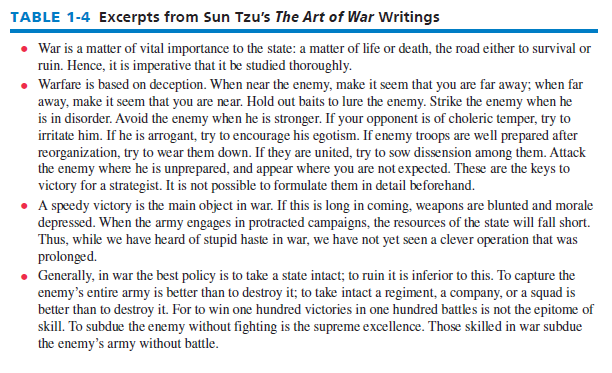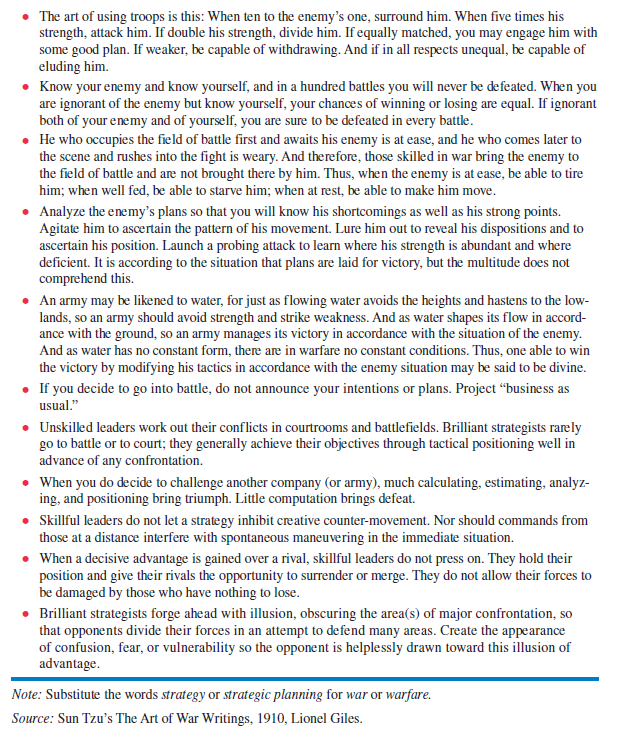A strong military heritage underlies the study of strategic management. terms such as objectives, mission, strengths, and weaknesses were first formulated to address problems on the battlefield. according to Webster’s New World Dictionary, strategy is “the science of planning and directing large-scale military operations, of maneuvering forces into the most advantageous position prior to actual engagement with the enemy.”18 the word strategy comes from the Greek strategos, which refers to a military general and combines stratos (the army) and ago (to lead). the history of strategic planning began in the military. a key aim of both business and military strategy is “to gain competitive advantage.” In many respects, business strategy is like military strategy, and military strategists have learned much over the centuries that can benefit business strategists today.
Both business and military organizations try to use their own strengths to exploit competitors’ weaknesses. If an organization’s overall strategy is wrong (ineffective), then all the efficiency in the world may not be enough to allow success. Business or military success is generally not the happy result of accidental strategies. Rather, success is the product of both continuous attention to changing external and internal conditions and the formulation and implementation of insightful adaptations to those conditions. The element of surprise provides great competitive advantages in both military and business strategy; information systems that provide data on opponents’ or competitors’ strategies and resources are also vitally important.
A fundamental difference between military and business strategy is that business strategy is formulated, implemented, and evaluated with an assumption of competition, whereas military strategy is based on an assumption of conflict. Nonetheless, military conflict and business competition are so similar that many strategic-management techniques apply equally to both. Business strategists have access to valuable insights that military thinkers have refined over time. Superior strategy formulation and implementation can overcome an opponent’s superiority in numbers and resources.
Born in Pella in 356 bce, Alexander the Great was king of Macedon, a state in northern ancient Greece. Tutored by Aristotle until the age of 16, Alexander had created one of the largest empires of the ancient world by the age of 30, stretching from the Ionian Sea to the Himalayas. Alexander was undefeated in battle and is considered one of history’s most successful commanders. He became the measure against which military leaders even today compare themselves, and military academies throughout the world still teach his strategies and tactics. Alexander the Great once said, “Greater is an army of sheep led by a lion, than an army of lions led by a sheep.” This quote reveals the overwhelming importance of an excellent strategic plan for any organization to succeed. the legendary Alabama football coach Bear Bryant asserted, “I will defeat the opposing coach’s team with my players, but if given a week’s notice, i could defeat the opposing coach’s team with his players and he take my players.”
Both business and military organizations must adapt to change and constantly improve to be successful. Too often, firms do not change their strategies when their environment and competitive conditions dictate the need to change. Gluck offered a classic military example of this:
When Napoleon won, it was because his opponents were committed to the strategy, tactics, and organization of earlier wars. When he lost—against Wellington, the Russians, and the Spaniards—it was because he, in turn, used tried-and-true strategies against enemies who thought afresh, who were developing the strategies not of the last war but of the next.19
Sun Tzu’s The Art of War has been applied to many fields well outside of the military. Much of the text is about how to fight wars without actually having to do battle: It gives tips on how to outsmart one’s opponent so that physical battle is not necessary. As such, the book has found application as a training guide for many competitive endeavors that do not involve actual combat, such as in devising courtroom trial strategy or acquiring a rival company. There are business books applying its lessons to office politics and corporate strategy. Many Japanese companies make the book required reading for their top executives. The book is a popular read among Western business managers who have turned to it for inspiration and advice on how to succeed in competitive business situations.
The Art of War has also been applied in the world of sports in preparing for athletic contests. NFL coach Bill Belichick is known to have read the book and used its lessons to gain insights in preparing for games. Australian cricket coaches, as well as Brazilian association football coaches Luis Felipe Scolari and Carolos Alberto Parreira, embraced the text. Scolari made the Brazilian World Cup squad of 2002 study the ancient work during their successful campaign.
Similarities can be construed from Sun Tzu’s writings to the practice of formulating and implementing strategies among businesses today. Table 1-4 provides narrative excerpts from The Art of War. As you read through the table, consider which of the principles of war apply to business strategy as companies today compete aggressively to survive and grow.



Source: David Fred, David Forest (2016), Strategic Management: A Competitive Advantage Approach, Concepts and Cases, Pearson (16th Edition).

18 May 2021
18 May 2021
17 May 2021
17 May 2021
18 May 2021
17 May 2021